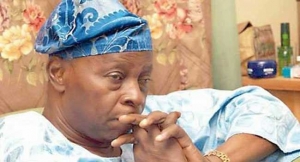
“In terms of refund of money, I want to say here that those people who are refunding money are those who got their money directly from the arms deal fund. Our fund did not come from the arms deal; our fund came from an electoral alliance with the PDP and we knew that the PDP had a fund raising committee that gathered billions of Naira and PDP had been in government for 16 years.
“We can’t refund any money to anybody because the money we got as a party came because of the alliance we had with the PDP (to pursue the re-election of ex-President Goodluck Jonathan) and we have the agreement note from this alliance. If it is possible that the money Chief Tony Anenih gave us was from the arms deal, it is left for them to ask Anenih to clarify. As far as we knew, we did not have any dealing with Dasuki. Our office did not ever have anything to do with the office or person of the National Security Adviser, Col. Sambo Dasuki.”
…National Chairman of the Social Democratic Party (SDP), Chief Olu Falae, insisting that he won’t return the controversial N100 million he collected from the former chairman, Board of Trustees of the Peoples Democratic Party (PDP), Chief Tony Anenih
A former presidential candidate and Afenifere leader, Chief Olu Falae, has admitted receiving 100 million Naira from the former Chairman of the Board of Trustees of the Peoples Democratic Party (PDP), Chief Tony Anenih.
Speaking to Channels Television on Sunday evening, Chief Olu Falae said that the money was received based on certain conditions and agreements and was transmitted to his party as soon as he got it.
He denied having anything to do with Colonel Sambo Dasuki, as rumoured.
“I never had any dealing whatsoever with the former National Security Adviser (NSA), Colonel Sambo Dasuki. No relationship at all,” he said, denying claims that he took money from the former NSA.
‘Six Conditions’
Explaining the circumstances behind the money he received from the PDP leader, he said: “All that I know is that Chief Tony Anenih, Chairman of the Board of Trustees of the PDP, approached me before the last election to seek the cooperation of my party, SDP [Social Democratic Party], with his own party in re-electing the former president in what they called an inter-party cooperation agreement.
“I gave him six conditions before we could agree to that request. One was that the government must prosecute the insurgency in the northeast more seriously. Two, that we are not happy with the level of corruption in their government and if we are to support them they must pledge to adopt a policy on zero tolerance for corruption. Three, that they will expeditiously restructure Nigeria by implementing the report of the 2014 National Conference. Four, that they will pursue the creation of jobs for the masses as a priority. Five, that they will reduce recurrent expenditure to create funds for development and six that if they win the election we will expect to play some roles in the new government.
“Those are the conditions we gave them and he accepted them.
“To formalise the matter, I wrote to him to confirm acceptance and in six days time he wrote back to say that all the organs of their party agreed to those conditions and they were happy with them and that they were happy to cooperate with us on that basis.
He further explained that after the agreement was approved by his party’s executive members, Mr Anenih called him to express the PDP’s readiness to support the party financially.
“After that he phoned me and said that he knew the SDP was a poor party and that we will need money to campaign for the President and other candidates that he will like to send us some money and he did so, which was the 100 million they are talking about, which I then passed on to the SDP party which then allocated the money to the various state branches of the party for the presidential and other elections. That is all that happened,” Mr Falae further explained.
He also promised to hold a press conference on Monday, January 11, 2016 to explain what truly transpired between his party and the PDP before the election campaigns.
Chief Falae’s political party, the Social Democratic Party (SDP), in an earlier statement signed by its National Publicity Secretary, Abdul Isiaq, on Sunday, had absorbed its National Chairman, Mr Olu Falae, of any wrong doing.
The party said that the 100 million Naira that was received by Falae from Mr Tony Anenih, was meant for the SDP/PDP Electoral Alliance project.
They also explained that the money was shared to all the 36 state chapters of the party in the build-up of the 2015 elections.
The party maintained that “neither the SDP nor Mr Falae was aware that the money came from the office of the former National Security Adviser, Colonel Sambo Dasuki, through Chief Anenih and meant for arms purchase”.
The party stressed that “the SDP as well as many Nigerians were aware that the PDP had a fund raising event prior to the election where billions of Naira was donated”.
They said that the SDP was also conscious of the fact that the PDP had ruled Nigeria for 16 years and expected that the PDP was capable of funding their part of the electoral alliance.



